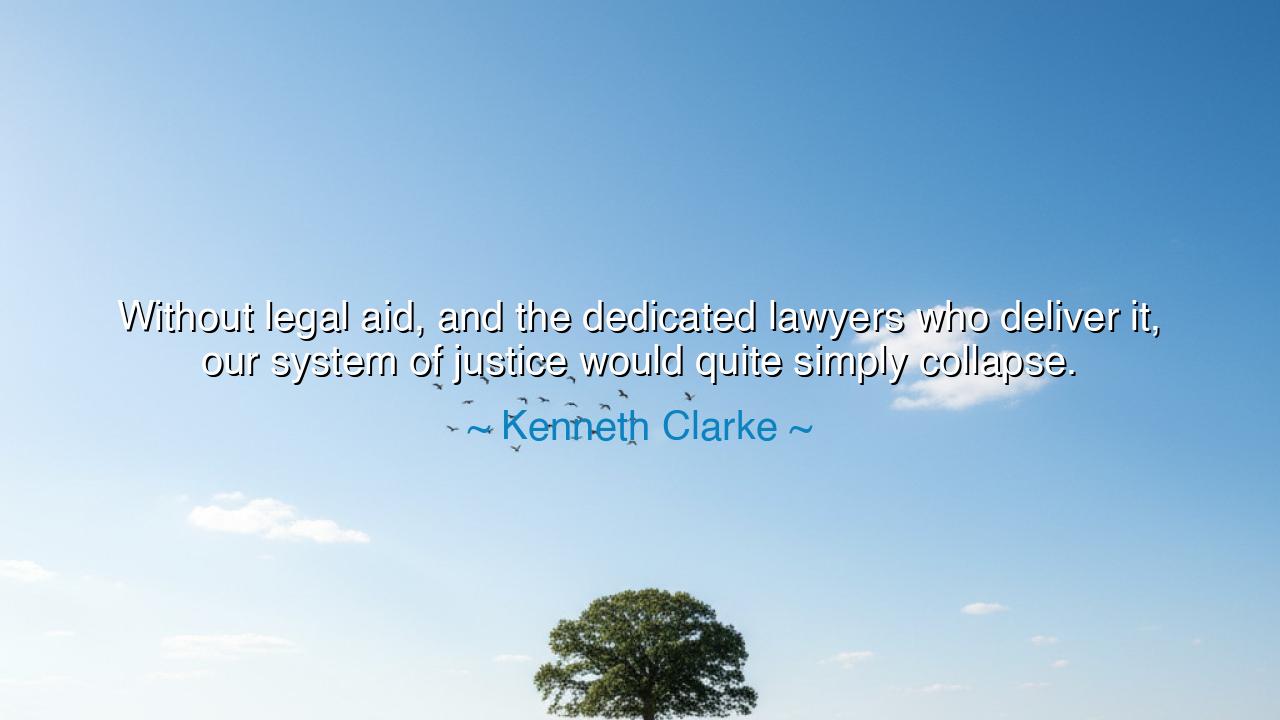
Without legal aid, and the dedicated lawyers who deliver it, our
Without legal aid, and the dedicated lawyers who deliver it, our system of justice would quite simply collapse.






"Without legal aid, and the dedicated lawyers who deliver it, our system of justice would quite simply collapse." Thus spoke Kenneth Clarke, a statesman who peered into the very heart of the law and saw its fragility. His words strike with force and clarity: that justice, which we often imagine as a great and unshakable edifice, is not held up by marble columns or lofty ideals alone, but by the tireless hands of those who ensure the poor, the voiceless, and the powerless can stand in its courts. Without legal aid, the balance tilts, and the scales of justice are no longer equal but corrupted, weighed by wealth and privilege.
The origin of this wisdom lies in the long history of law itself. From the days of Hammurabi to the courts of Rome, from Magna Carta to modern constitutions, the promise of justice has always been fragile. The poor man and the rich man may stand accused of the same crime, but without a defender, the poor man’s voice is drowned. Legal aid arose to bridge this chasm, to ensure that justice was not a privilege of the few but the right of all. Clarke, in his words, reminds us that this bridge is not ornamental—it is the very foundation without which the entire system would crumble into tyranny.
Consider the story of Clarence Earl Gideon in the United States. Accused of burglary in 1961, he stood in court without a lawyer, forced to defend himself against trained prosecutors. Unsurprisingly, he was convicted. But from his prison cell, he petitioned the Supreme Court, declaring that the right to counsel should belong to all, not just to those who could afford it. In 1963, the Court agreed, in the case of Gideon v. Wainwright, establishing the principle that legal defense is a fundamental right. This case became a beacon for the world, showing that without dedicated lawyers, justice becomes an empty word.
The teaching is heroic and humbling. We imagine justice as a goddess blindfolded, weighing only truth. But in reality, if one side enters the courtroom armed with skilled counsel and the other stands defenseless, the blindfold becomes a mockery. Clarke reminds us that the true guardians of justice are not only the judges in their robes, but also the humble, underpaid, and overworked lawyers of legal aid, who defend the weak, not for glory or wealth, but for the preservation of fairness itself. They are the unsung warriors without whom society would decay into a realm where only power speaks.
Yet his words are also a warning. For in many lands, legal aid is weakened, starved of funding, dismissed as unnecessary. When this happens, the collapse Clarke foresees begins quietly. The poor stop seeking help. The guilty walk free because the innocent cannot mount a defense. Faith in the courts falters, and when faith is lost, people turn not to law but to vengeance. Thus, the absence of legal aid is not simply an inconvenience—it is the slow unraveling of civilization itself.
The lesson for us, then, is clear: we must honor and support those who labor in legal aid. Their work is not charity but the very maintenance of freedom. Just as armies guard borders and teachers guard the mind, so too do legal defenders guard the dignity of the common man. Without them, laws are parchment, rights are illusions, and justice is but a mask for oppression.
What practical steps shall we take? Defend the funding and strength of legal aid in every nation. Encourage young lawyers to see not only the lure of wealth, but the nobility of service. As citizens, understand that the rights we take for granted are safeguarded daily by these guardians, and lend them our voice when they are under threat. To honor justice is not merely to revere its ideals but to sustain those who labor tirelessly in its shadow.
So let Clarke’s words echo like a bell of warning and of hope: without legal aid, justice collapses. But with it, upheld by the courage of dedicated men and women, the system of law stands tall, protecting rich and poor alike, and ensuring that liberty is not a privilege, but the birthright of all.






AAdministratorAdministrator
Welcome, honored guests. Please leave a comment, we will respond soon